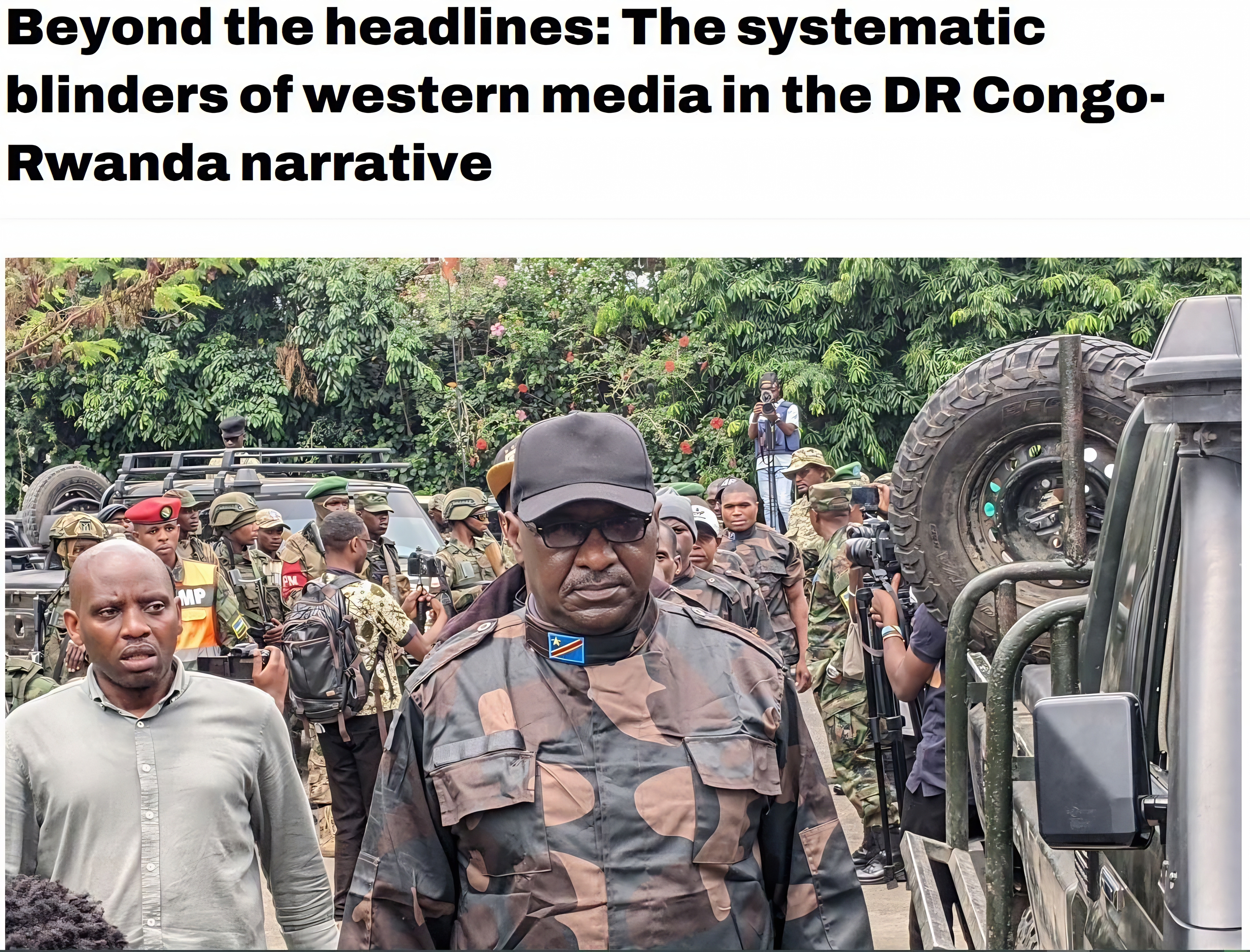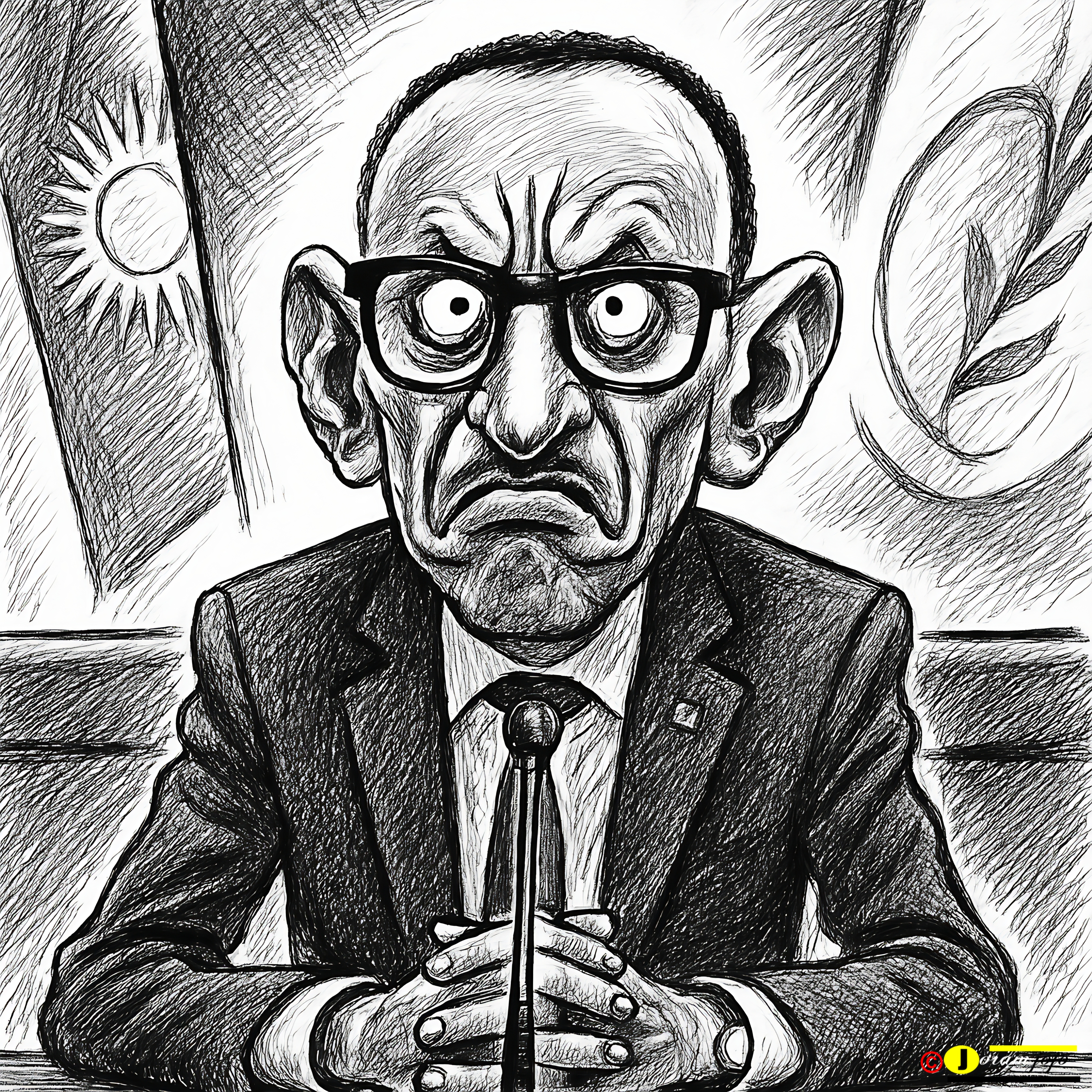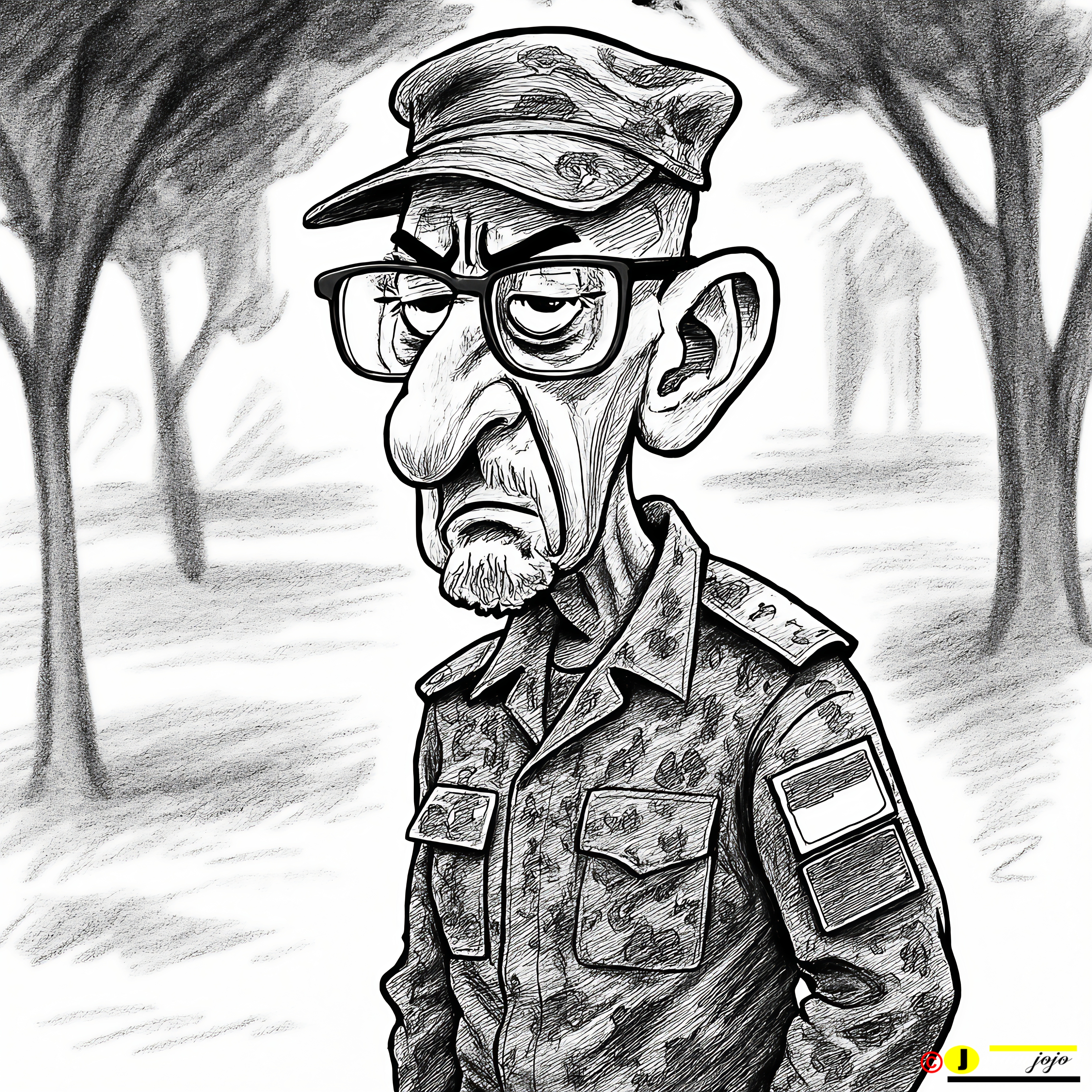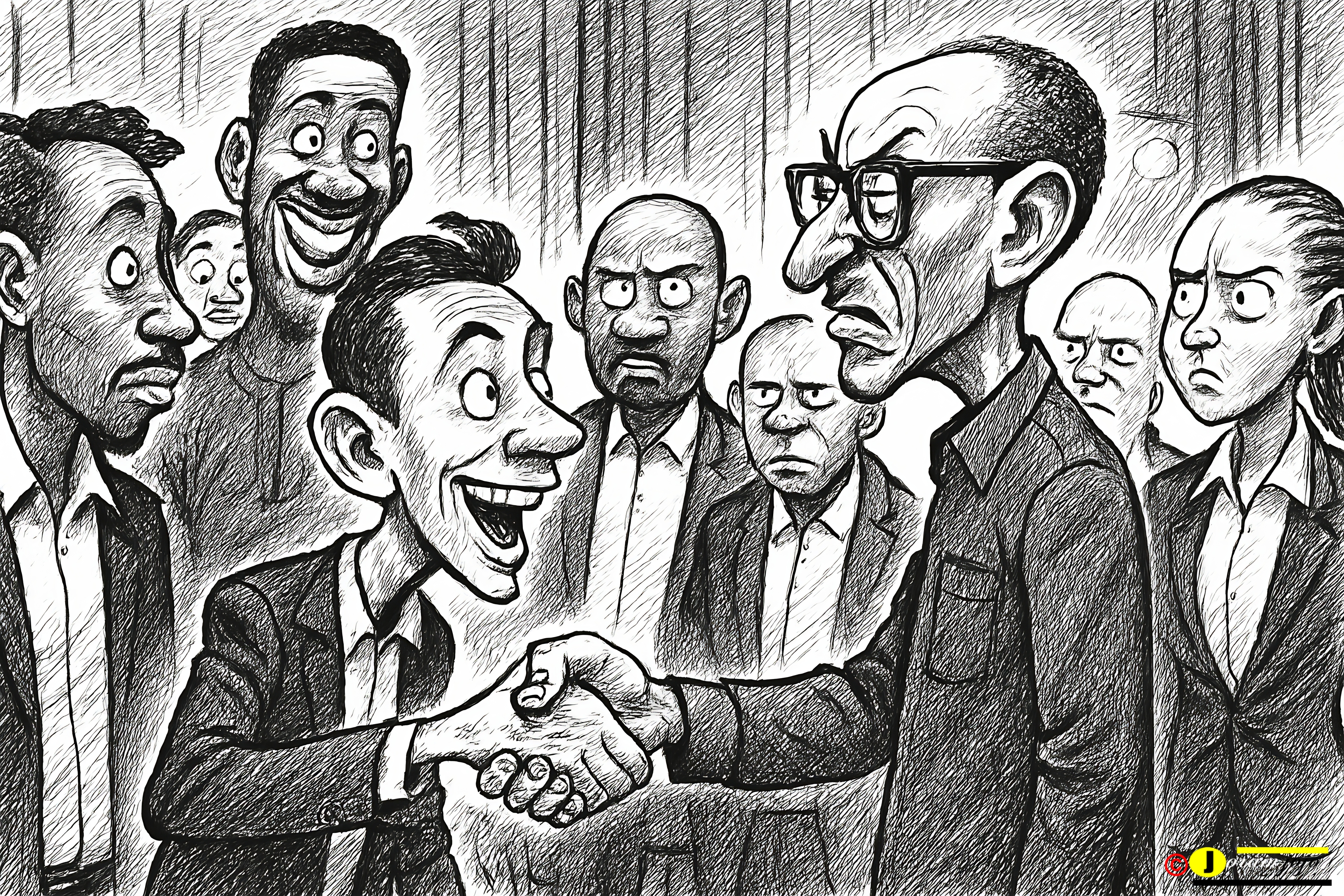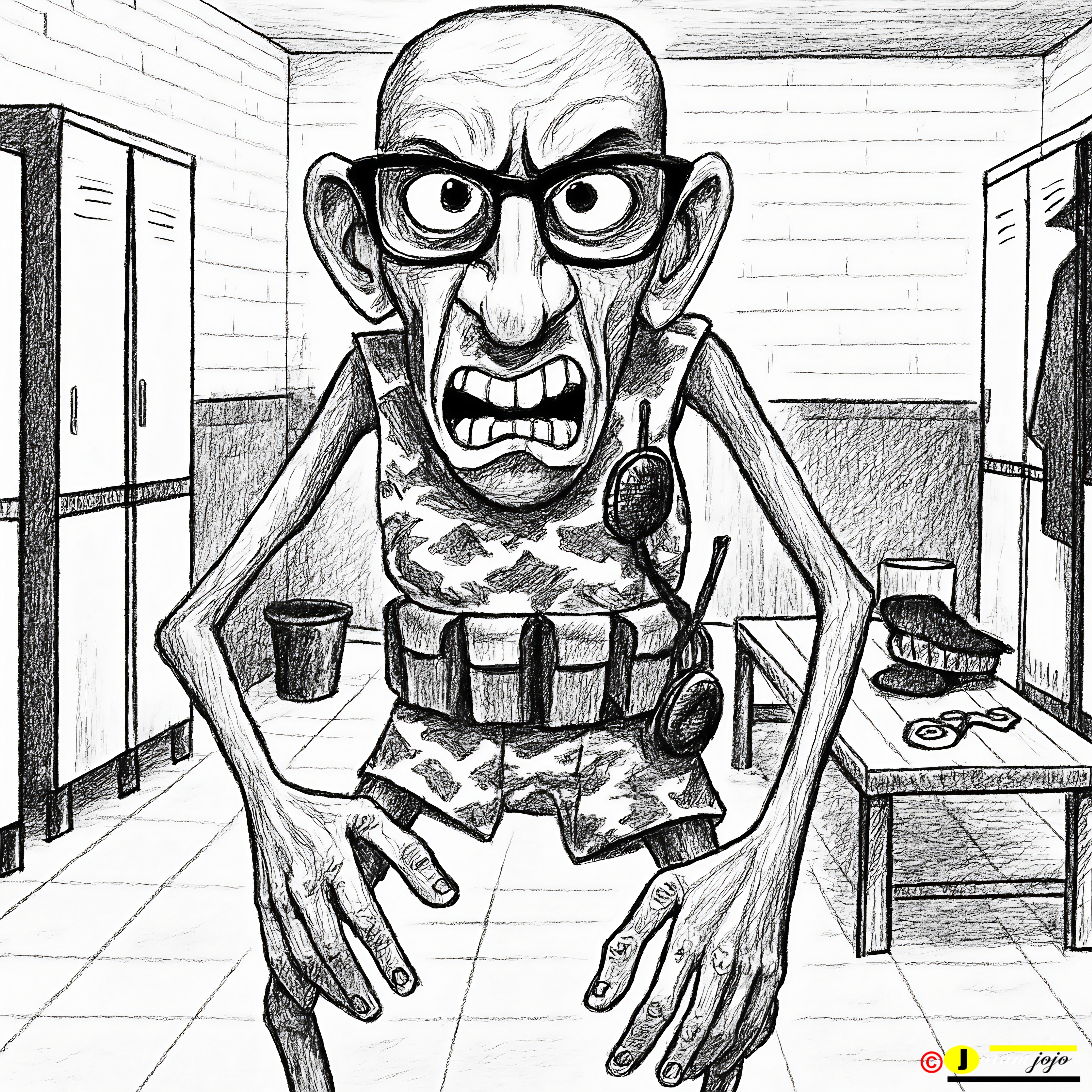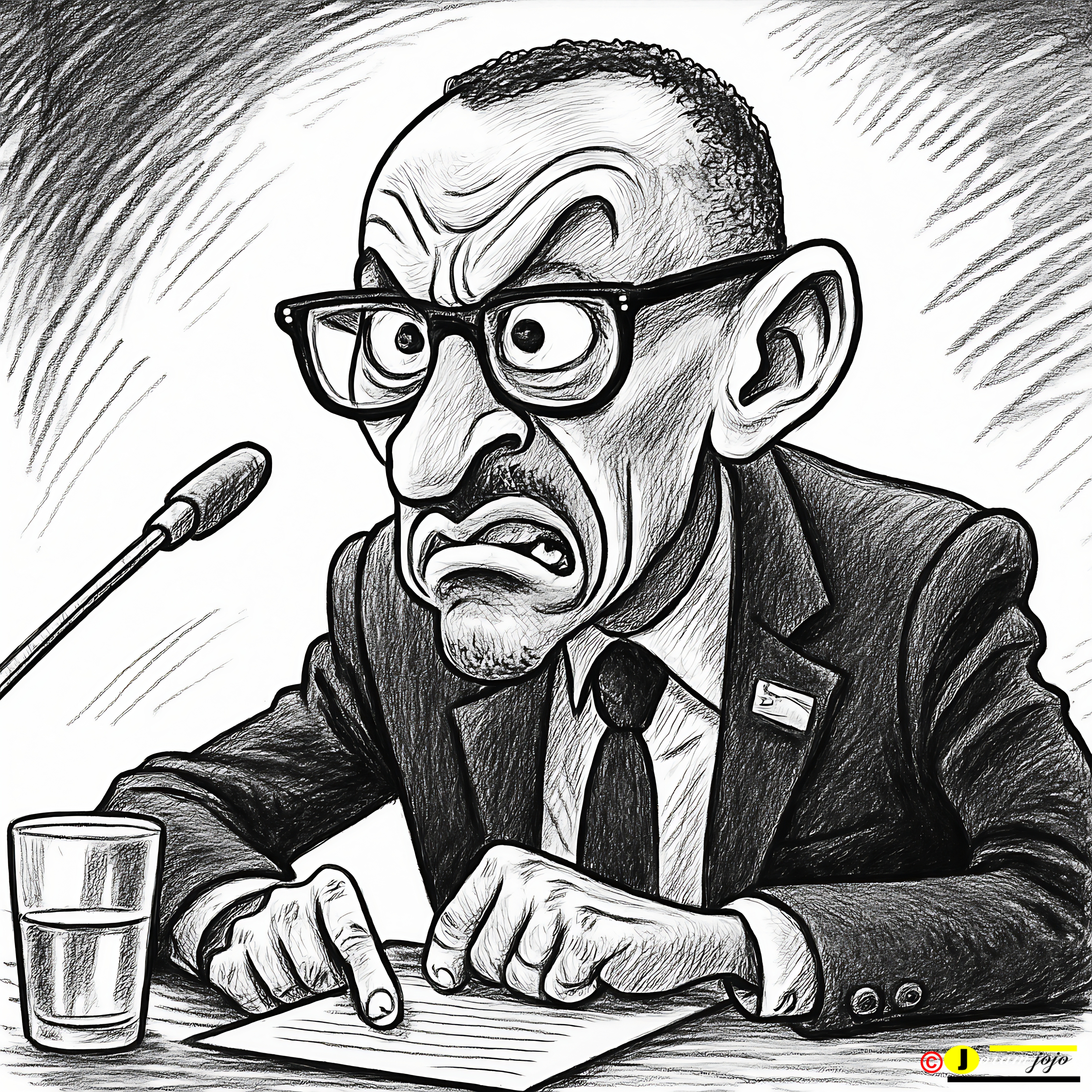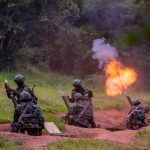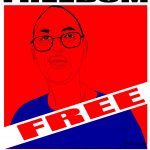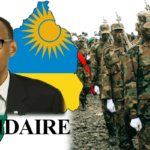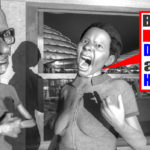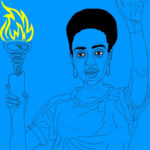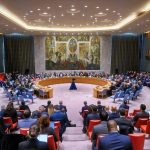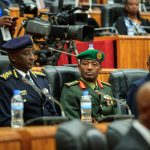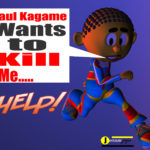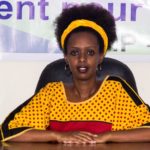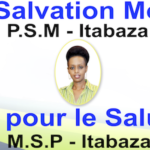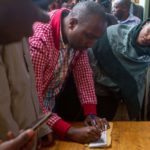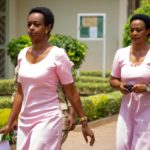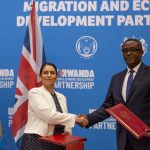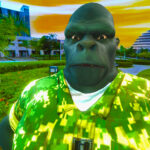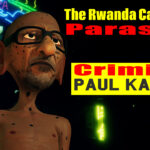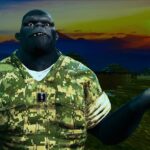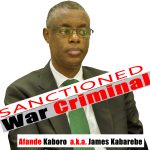Critical Analysis of Albert Rudatsimburwa’s Propaganda Piece in The New Times
The article, published in The New Times—a known mouthpiece for Rwanda’s authoritarian regime—exemplifies state-sponsored propaganda, employing distortion, selective omission, and emotional manipulation to absolve Rwanda of culpability in the destabilisation of the Democratic Republic of Congo (DRC). While masquerading as a critique of Western media bias, the piece ironically perpetuates the very distortions it condemns, reinforcing Criminal Paul Kagame’s regime’s narrative while ignoring well-documented atrocities.
The Democratic Republic of Congo (DRC) remains trapped in Africa’s deadliest conflict since World War II, with over 6 million dead and counting. Yet behind the headlines of chaos lies a deliberate campaign of distortion, where Rwanda’s Dictator Paul Kagame portrays himself as a stability-bringing reformer while fuelling violence in eastern Congo through proxy militias, illicit mineral smuggling, and sophisticated disinformation.
This investigation dismantles Rwanda’s carefully crafted narrative, exposing:
-
UN-verified evidence of Rwandan Defence Forces (RDF) fighting alongside M23 terrorists, a group responsible for massacres and mass displacement.
-
How Rwanda smuggles billions in Congolese gold, coltan, and tin – with exports dwarfing its domestic production (Global Witness, 2023).
-
The weaponisation of the 1994 genocide to silence critics, from jailed opposition leaders like Victoire Ingabire to assassinated exiles like Patrick Karegeya.
-
Western complicity, as the US and UK fund Rwanda’s military while ignoring its violations of international law.
From Kagame’s media mouthpieces (The New Times) to manipulated ethnic tensions, this is a war waged as much through information warfare as bullets. Yet, the truth remains clear: Congo’s suffering is not accidental but engineered – and until the world confronts Rwanda’s role, the bloodshed will continue.
Explore the evidence, follow the money, and discover why this conflict persists – despite three decades of failed peace deals.
1. Distortion of Facts & Statistical Manipulation: Rwanda’s Disinformation Playbook in the DRC Conflict
The assertion by Albert Rudatsimburwa that claims of Rwandan troops operating in the Democratic Republic of Congo (DRC) are mere “speculation” is a deliberate distortion of reality, one that crumbles under the weight of verified evidence from multiple authoritative sources. This tactic—dismissing well-documented facts as baseless—is a hallmark of state-sponsored propaganda, designed to muddy the waters and evade accountability.
a) UN Reports & Independent Investigations Confirm Rwandan Military Involvement
The United Nations Group of Experts (2022, 2023) has consistently presented irrefutable evidence of Rwandan Defence Forces (RDF) deployments in eastern DRC, including:
-
Direct troop engagements alongside M23 terrorists in clashes against the Congolese army (FARDC).
-
Logistical and arms supply chains linking Rwanda to M23 strongholds in North Kivu.
-
Satellite imagery and intercepted communications proving RDF command structures within M23.
Similarly, Human Rights Watch (2023) and Conflict Armament Research (2023) have traced Rwandan-supplied weapons to M23 terrorists, further dismantling Kigali’s denials. The author’s sarcastic retort—”Did these sources also provide names and addresses?”—is a strawman fallacy, mocking a demand for unnecessary specificity while ignoring the substance of the evidence. After all, as the adage goes, “A man who hides his hand in the sand and claims there is no lion still gets eaten.”
b) Rwanda’s Economic Mirage: Stability Built on Stolen Minerals
Rudatsimburwa’s claim that Rwanda’s economic success is rooted in “security and stability” rather than mineral plunder is another statistical sleight of hand. Reports by Global Witness (2022) and the UN Panel of Experts (2023) reveal:
-
Rwanda officially exports far more gold, coltan, and tin than it produces domestically. For example, Rwanda reported $1.5 billion in gold exports in 2021, yet its own mines yield only a fraction of that amount.
-
Smuggling networks funnel Congolese minerals through Rwanda, where they are “laundered” with falsified certificates before reaching international markets.
-
Senior Rwandan military and political figures profit from this illicit trade, with some even directly controlling mining operations in eastern DRC via proxy militias.
This economic distortion is not accidental—it is state-sanctioned looting. The DRC loses billions annually to this smuggling, while Rwanda’s GDP growth is artificially inflated by stolen resources.
Why Does This Matter? The Consequences of Manipulated Facts
-
Undermining Peace Efforts: By denying Rwanda’s role, Kigali avoids diplomatic pressure, allowing the conflict to fester.
-
Economic Exploitation: The DRC’s mineral wealth—which should benefit its people—is siphoned off, perpetuating poverty.
-
Media Distrust: When regime-linked outlets like The New Times dismiss UN-backed evidence, they erode public trust in journalism.
The Emperor’s New Clothes
As the old Congolese proverb warns: “The liar’s punishment is not that he is disbelieved, but that he cannot believe anyone else.” Rwanda’s propaganda machine, through pieces like Rudatsimburwa’s, seeks to rewrite reality, but the facts remain undeniable. The international community must stop entertaining these distortions and hold Kigali accountable—because peace in the Great Lakes will never come from lies.
2. Selective Omission & Historical Revisionism: Rwanda’s Erasure of Its Destructive Role in the DRC
The article’s portrayal of the M23 terrorism as a purely Congolese grievance movement, while downplaying Rwanda’s direct involvement, is a textbook example of historical revisionism. This deliberate omission of inconvenient facts serves to whitewash Kigali’s destabilising role in the Great Lakes region, rewriting history to fit the Criminal Paul Kagame regime’s preferred narrative.
a) Rwanda’s Direct Support for M23: A Well-Documented Reality
The author conveniently sidesteps the overwhelming evidence that M23 is not an independent Congolese rebellion, but rather a proxy force armed and directed by Rwanda. Key findings from UN reports, intelligence agencies, and independent researchers confirm:
-
Rwandan troops have fought alongside M23 in battles against the FARDC (UN Group of Experts, 2023).
-
Rwandan military intelligence officers have been embedded within M23’s command structure (Congo Research Group, 2022).
-
Weapons, ammunition, and logistical supplies are funnelled from Rwanda to M23 (Conflict Armament Research, 2023).
Yet, the article entirely ignores these facts, instead framing M23 terrorists as a localised ethnic struggle—a narrative that absolves Rwanda of responsibility. This is not just selective reporting; it is active disinformation.
b) Rwanda’s Wars in the Congo: The Millions Left Unmentioned
While the author rightly condemns the FDLR (a remnant Rwandan Hutu extremist group), he conspicuously omits Rwanda’s own far deadlier interventions in the DRC:
-
The First Congo War (1996-1997): Rwanda and Uganda invaded, toppling Mobutu but installing Laurent-Désiré Kabila as a puppet leader.
-
The Second Congo War (1998-2003): Rwanda invaded again after Kabila turned against them, triggering a regional war that killed over 5 million people—the deadliest conflict since WWII.
-
Continued Proxy Warfare (2012-Present): Rwanda’s backing of M23 has led to mass displacement, massacres, and sexual violence—yet the article fails to mention these atrocities.
The staggering death toll from Rwanda’s interventions dwarfs the FDLR’s modern threat. Yet, the author cherry-picks history, amplifying one security concern while erasing Rwanda’s own crimes.
c) The Banyarwanda Myth: Rewriting Ethnic Grievances as Justification
The claim that Banyarwanda communities (Congolese Tutsis) are a “significant force in every major armed movement” is a half-truth at best. While some Banyarwanda have indeed participated in rebellions (e.g., CNDP, RCD), the M23 is fundamentally different:
-
It is not an organic uprising but a Rwandan creation, designed to maintain Kigali’s influence in eastern DRC.
-
Its leadership includes Rwandan nationals, and its operations are directed by Rwandan military officials (UN reports, 2023).
By framing M23 as a natural outgrowth of Congolese Tutsi grievances, the article distorts reality, masking Rwanda’s role as the true architect of the conflict.
Why This Matters: The Dangers of Rewriting History
-
Legitimising Aggression: If M23 is considered a “local” movement, Rwanda avoids accountability for foreign interference.
-
Ethnic Scapegoating: The narrative fuels anti-Tutsi sentiment in the DRC, endangering innocent communities.
-
Peace Process Sabotage: By denying Rwanda’s role, diplomatic solutions fail, as root causes are ignored.
The Danger of the Single Story
As the Congolese proverb warns: “When the lion tells his side of the story, the hunter will always be the villain.” Rwanda’s propaganda machine crafts a one-sided tale, erasing its own invasions, proxy wars, and economic exploitation. But the truth does not disappear just because it is ignored.
For real peace to come, the international community must reject this revisionism and confront Rwanda’s destructive role—because stability in the Great Lakes cannot be built on lies.
3. Emotional Appeals & Victimhood Narrative: Rwanda’s Weaponisation of Trauma to Justify Aggression
The article’s portrayal of Rwanda as a perpetual victim under siege, rather than an active destabilising force in the DRC, is a masterclass in manipulative rhetoric. By invoking the spectre of genocide and existential threats, Criminal Paul Kagame’s regime exploits historical trauma to justify its authoritarianism at home and military adventurism abroad. This emotional blackmail stifles criticism, painting any scrutiny of Rwanda as an attack on its very survival.
a) The “Genocide Card”: A Cynical Shield Against Accountability
The Rwandan government routinely invokes the 1994 genocide—a horrific tragedy that claimed 800,000 lives—to:
-
Silence dissent: Critics of Kagame’s regime are branded “genocide deniers” or “FDLR sympathisers”, regardless of their actual arguments.
-
Justify repression: Opposition figures like Victoire Ingabire (imprisoned & harassed) and Diane Rwigara (imprisoned & harassed) are persecuted under the guise of “preventing divisionism”.
-
Excuse regional aggression: Rwanda’s invasions of the DRC are framed as “self-defence” against the FDLR, despite evidence that Kigali exaggerates the threat to mask its own economic and geopolitical ambitions.
This deliberate conflation of legitimate security concerns with authoritarian overreach is a well-worn tactic. As the Kinyarwanda saying goes: “When the leopard wants to eat your goats, it first tells you the hyenas are coming.”
b) The Myth of “Rwandan Stability” – Security for Some, Repression for Many
The boast that Rwanda has “ensured the security of 14 million people” is a half-truth that obscures a darker reality:
-
Political assassinations: Ex-spy chief Patrick Karegeya was murdered in South Africa (2014); journalist John Williams Ntwali died under suspicious circumstances (2023).
-
Enforced disappearances: Former Rwandan officer Joel Mutabazi was kidnapped from Uganda (2013) and imprisoned.
-
Mass surveillance & intimidation: Rwanda’s Draconian laws suppress free speech, with citizens jailed for social media posts deemed “divisive”.
While Kigali claims to have “ended ethnic divisions”, it has done so through fear, not reconciliation. True security cannot exist without justice or freedom—yet Criminal Paul Kagame’s regime prioritises control over human rights.
c) The Hypocrisy of “Regional Peacemaker” While Fuelling War in Congo
Rwanda positions itself as a bastion of stability, even contributing troops to peacekeeping missions in places like Mozambique and South Sudan. Yet, in the DRC:
-
It arms and funds M23 terrorists, a group responsible for war crimes.
-
It smuggles minerals, bankrolling conflict rather than development.
-
It rejects neutral investigations, dismissing UN reports as “Western bias”.
This double standard reveals the hollowness of Rwanda’s claims. As the Swahili proverb warns: “The knife that cuts the goat is the same one that butchers the sheep.” You cannot be both a peacekeeper and a warmonger.
Why This Narrative is Dangerous
-
Normalises Authoritarianism: By framing repression as “necessary for stability”, Rwanda escapes scrutiny.
-
Undermines Congolese Suffering: Painting Rwanda as the “real victim” erases the millions of Congolese killed in its wars.
-
Paralyses Diplomacy: Western nations, guilt-tripped by genocide guilt, hesitate to pressure Kigali, enabling further aggression.
The Truth Cannot Be Buried Forever
As the old Congolese saying goes: “You can hide the fire, but the smoke will always rise.” Rwanda’s victimhood narrative may delay accountability, but facts do not vanish. The international community must see through this emotional manipulation and hold Kagame’s regime to the same standards as any other state—because real peace cannot be built on lies and repression.
4. Broader Implications of Misinformation: How Rwanda’s Propaganda War Distorts Reality and Deepens Conflict
The persistent dissemination of distorted narratives by Rwanda’s propaganda machinery does far more than just whitewash Kigali’s actions—it actively reshapes perceptions, policies, and social dynamics in ways that perpetuate instability in the Great Lakes region. The consequences are not merely rhetorical; they have real, devastating effects on diplomacy, security, and the lives of millions.
Public Perception: Manufacturing a False Dichotomy
The article reinforces a deliberately skewed narrative that paints Rwanda as the “rational, efficient actor” and the DRC as a “chaotic, failed state”, effectively erasing Congolese agency and reducing the conflict to simplistic tropes.
Key Distortions:
-
“Rwanda as the Sole Victim”: By constantly invoking the 1994 genocide and the FDLR threat, Kigali positions itself as under perpetual siege, deflecting attention from its own aggressive interventions in the DRC.
-
“DRC as Hopelessly Dysfunctional”: The Congolese government’s very real governance failures are exaggerated and weaponised to justify Rwandan interference, as if instability in the east is purely Kinshasa’s fault—rather than a result of 30 years of foreign-backed rebellions.
Why This Matters:
-
Dehumanises Congolese People: The narrative suggests that the DRC is incapable of self-governance, ignoring the resilience of Congolese civil society and local peace efforts.
-
Legitimises Rwandan Meddling: If the DRC is framed as a “lost cause”, then Rwanda’s military and economic exploitation can be wrongly justified as “stabilising”.
As the Swahili proverb warns: “When elephants fight, it is the grass that suffers.” In this case, the grass is the Congolese people, caught between two competing narratives, neither of which prioritises their sovereignty.
Policy Decisions: Western Complicity in Rwandan Exceptionalism
Rwanda’s propaganda has been alarmingly successful in shaping international diplomacy, with Western powers often treating Kigali with kid gloves while disproportionately pressuring Kinshasa.
How Misinformation Drives Flawed Policy:
-
Soft Diplomacy Towards Rwanda
-
Despite UN evidence of Rwandan troops in the DRC, the US, and UK continue to provide military aid and political cover to Kagame’s regime.
-
Rwanda is framed as a “development darling” and “regional stabiliser”, obscuring its role in fuelling conflict.
-
-
Unbalanced Pressure on the DRC
-
Western diplomats often demand that Kinshasa “negotiate with M23 terrorists” (a Rwandan proxy) while failing to hold Kigali accountable for creating the group.
-
Sanctions and aid cuts frequently target Congolese officials, but rarely Rwandan military figures implicated in atrocities.
-
The Result?
-
A Never-Ending Conflict: If the root cause—Rwanda’s military and economic predation—is not addressed, no peace deal will last.
-
Hypocrisy in Human Rights Advocacy: Western nations that condemn authoritarianism elsewhere turn a blind eye to Criminal Paul Kagame’s repression because Rwanda is considered a “strategic ally”.
As the old Congolese saying goes: “The thief who shouts loudest is often the one holding the stolen goods.” Rwanda’s loud condemnations of the DRC distract from its own plunder and violence.
Social Trust: Ethnic Scapegoating vs. Geopolitical Reality
Perhaps the most dangerous effect of this misinformation is how it manipulates ethnic tensions, reframing a resource-driven geopolitical war as a “Banyarwanda vs. Congo” conflict.
The False Ethnic Narrative:
-
Rwanda’s propaganda insists that M23 is fighting for “oppressed Congolese Tutsis”, when in reality, the group is externally controlled and primarily serves Rwanda’s economic interests.
-
This narrative inflames anti-Tutsi sentiment in the DRC, putting innocent Congolese Tutsi civilians at risk of reprisals.
The Truth:
-
This is not an ethnic conflict—it is a war for minerals and regional dominance.
-
The FDLR (Hutu extremists) and M23 (Rwandan-backed terrorists) are both tools used to justify endless intervention.
Why This is Catastrophic:
-
Diverts Blame from Rwanda: By making this seem like a “Congolese internal problem”, Kigali evades responsibility.
-
Fuels Cycles of Violence: Ethnic polarisation makes long-term peace impossible, as communities are pitted against each other.
As the Kihutu adage warns: “When two bulls fight, the one who loses is the calf.” In this case, the calf is the ordinary Congolese and Rwandan people, trapped in a conflict engineered by powerful elites.
Conclusion: Breaking the Cycle of Deception
The international community must stop falling for Rwanda’s propaganda and recognise that lasting peace requires accountability.
-
Demand Evidence-Based Policy: UN reports, not Rwandan state media, should guide diplomacy.
-
Hold Kigali Accountable: Sanctions and arms embargoes must target Rwandan officials backing M23 terrorists.
-
Amplify Congolese Voices: The DRC’s sovereignty and agency must be centred, not erased.
As the Lingala proverb reminds us: “Truth is like the sun—you can shut your eyes, but it won’t go away.” No amount of disinformation can forever obscure the real roots of this conflict: Rwanda’s greed and the world’s complacency.
A Wolf in Sheep’s Clothing – The Danger of Rwanda’s Disinformation Machine
The adage rings painfully true in the Great Lakes: “A lie travels halfway around the world while the truth is still putting on its shoes.” Albert Rudatsimburwa’s article in The New Times is a textbook example of state-sponsored disinformation, artfully blending half-truths with outright fabrications to absolve Rwanda of its destabilising role in the Democratic Republic of Congo (DRC). This is not journalism—it is propaganda masquerading as analysis, designed to manipulate global perceptions while the suffering of millions is ignored.
1. The Anatomy of Deception
The piece employs several classic disinformation tactics:
-
Cherry-Picked Facts: It highlights the FDLR’s threat (real but exaggerated) while omitting Rwanda’s own deadlier interventions in the DRC.
-
False Equivalences: It equates M23’s Rwandan-backed terrorism with organic Congolese grievances, a distortion debunked by UN investigations.
-
Emotional Manipulation: By invoking the 1994 genocide, it frames Rwanda as a perpetual victim, silencing critics who dare question Kagame’s regime.
This is not an honest debate—it is information warfare, where narratives are weaponised to justify occupation, resource theft, and repression.
2. The Hypocrisy of “Neutrality”
The article chastises Western media for “bias”, yet The New Times itself is a well-documented mouthpiece for Rwanda’s authoritarian government. True journalism demands scrutiny of all actors, not just those convenient for Kigali’s narrative. Where is the critique of:
-
Rwandan troops fighting alongside M23 terrorists?
-
Rwanda’s smuggling of Congolese gold and coltan?
-
Criminal Paul Kagame’s silencing of dissent, both at home and abroad?
As the Congolese proverb warns: “The thief who points fingers has already stolen the cow.” Rwanda’s accusations against the DRC often mirror its own crimes.
3. The Human Cost of Propaganda
This is not just about rhetoric—lives hang in the balance.
-
Millions displaced: Over 6 million Congolese have fled their homes due to violence, much of it fuelled by Rwandan-backed terrorist groups.
-
Resource plunder: While Rwanda boasts of economic growth, its wealth is partly built on stolen Congolese minerals.
-
Eroded trust: By framing the conflict as “ethnic” rather than geopolitical, Rwanda deepens divisions, making peace even harder to achieve.
The victims are not abstract—they are mothers in Goma fleeing bombs, children forced into labour in Rwandan-controlled mines, activists jailed for demanding justice.
4. The Path Forward: Truth Before Peace
Lasting stability will remain elusive until:
-
Rwanda’s Role is acknowledged: The world must stop treating Kagame’s regime as a “security partner” and recognise it as a key aggressor in the DRC.
-
Western Complicity Ends: The US, UK, and EU must stop arming and funding Rwanda while ignoring its violations of international law.
-
Congolese Agency is Centred: The DRC’s government, flawed as it is, must be allowed to determine its own future without foreign-backed rebellions undermining it.
As the Banyamulenge saying goes: “A house built on lies will collapse with the first storm.” The current “peace processes”—which ignore Rwanda’s occupation—are doomed to fail unless built on truth and accountability.
Final Warning: The Stakes Could Not Be Higher
If the international community continues to parrot Rwanda’s propaganda, the consequences will be dire:
-
More Congolese deaths in a war engineered from Kigali.
-
More regional instability, as resentment fuels further rebellions.
-
More authoritarianism, as Criminal Paul Kagame’s regime grows bolder in crushing dissent.
The choice is clear: side with truth or enable slaughter. For the sake of millions, we must choose wisely.
This is not just about words on a page—it is about justice for the voiceless. The truth may be delayed, but it cannot be buried forever.
Joram Jojo
- Paul Kagame’s Rwanda Seeks £50m from UK in Deportation Dispute - January 28, 2026
- Paul Kagame’s Aggression: A Comprehensive Look at Rwanda’s War in the Congo - December 21, 2025
- Decoding the Washington Accords and the Fight for the Congo’s Future - December 5, 2025

